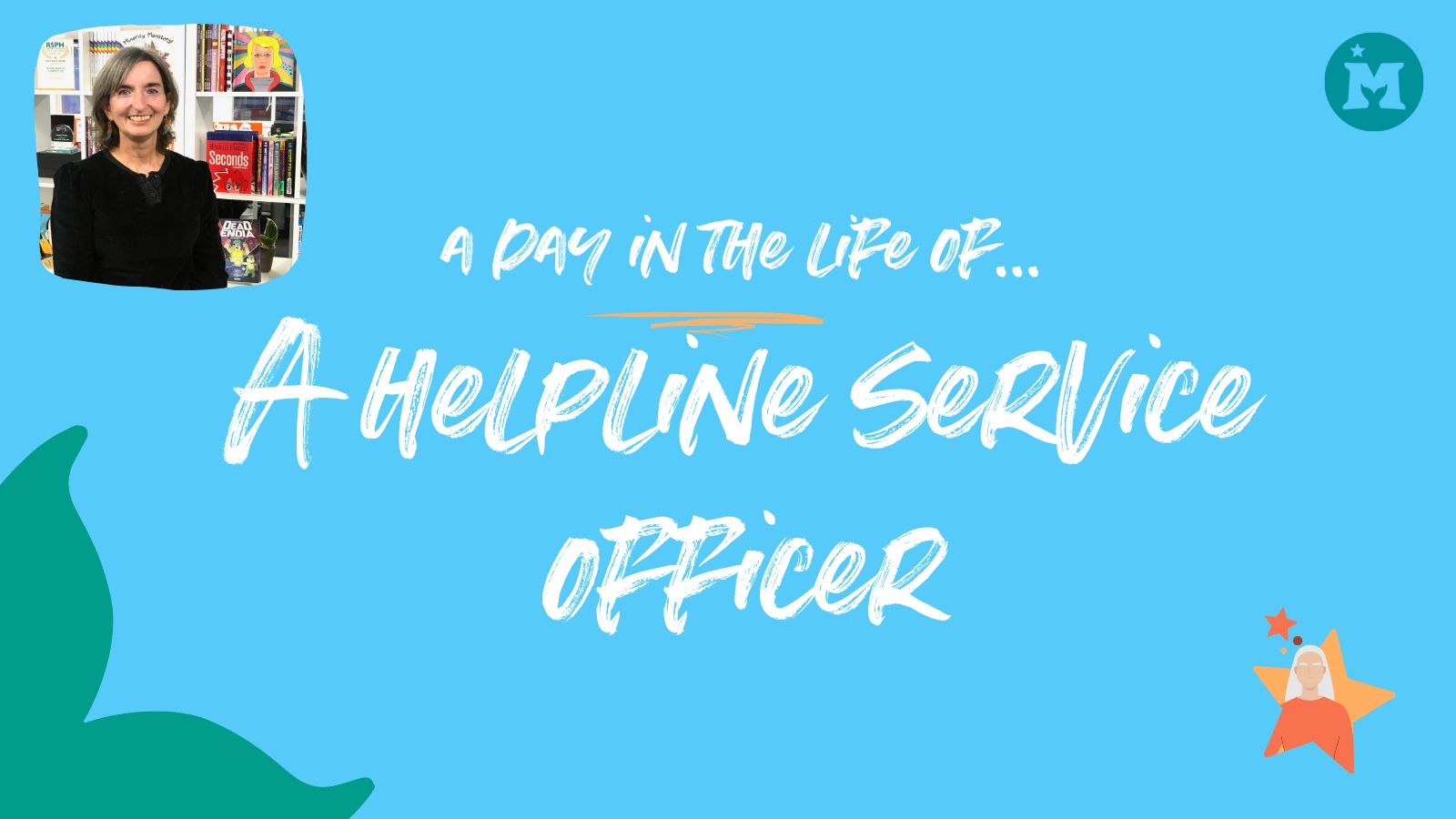
Happy New Year! Welcome to the second instalment of our Day In The Life series. Here, we spotlight the important work being done by Mermaids and the people who make the charity what it is.
Meet Kerry (she/her), one of our Helpline Services Officers, who marks her fourth year at Mermaids this spring.
Kerry started out as a volunteer before joining the charity as a staff member. Today, you will find her on the frontline, answering your calls or replying to messages over webchat. Whatever the problem, she’ll be here for you with a kind and supportive ear.
Read on to find out how she looks after her wellbeing in this role and discover what she’s most looking forward to in 2022.
What attracted you to Mermaids and the role of Helpline Service Officer?
I’m a qualified youth worker and most of my jobs have involved empowering and supporting people who are fighting against being marginalised. I previously worked with an all-women organisation supporting young mothers in making decisions that would benefit them. I’ve always been keen to support young people to advocate for themselves and create space for those voices to be heard.
What attracted me to Mermaids is the fact that it’s a campaigning organisation. Empathy is important but empowering people to help themselves and be proactive is invaluable. There are a lot of strands to the work Mermaids does too. From the campaigning work of the Policy team, to the advocacy work of the Communications team. When everything comes together it’s harmonious. Taking that first call at the start of my shift, I like to think each department has something to offer.
What does a typical day look like for you?
Busy! The support line is open Monday to Friday, 9am to 9pm, so it is pretty non-stop the majority of the time! I like to have a good breakfast as you don’t know when your next break is going to come. As we all work on different shift patterns there isn’t a set time I start, but, once I do, it’ll be a mix of taking calls, replying to messages via our webchat, moderating new members that apply to join the forum as well as background admin tasks.
If I take a longer call, if someone needs a listening ear, I might end up working a bit later as I want to make sure I’m leaving that person in a better place.
Our callers are such a mixed bag. It can be a relatively young person who is struggling at school without a support network or a parent who is struggling at home with a lack of resources.
Empathy is important but empowering people to help themselves and be proactive is invaluable”
We get a number of young people who use the support line regularly. When we hear there has been a little progression for an individual in their situation it means a lot to us.
We are trained to encourage people to reach out for support at home, or signpost them to organisations that may have a focus in supporting people struggling with their mental health or housing or are of a particular faith or culture. It’s important to be up to date with the different local services available so we’re equipped to offer a wide range of support for specific challenges.
Outside of frontline support, it’s essential that I engage with my own self-development by reading books or articles that come out to ensure I am up to date with current references. Additionally, the Policy team makes sure the frontline staff are up to date with the bigger monumental news for the community.
Supporting young people and families through difficult times must have an impact on your mental health. What are your coping strategies?
The team is a great support to one another. We are always checking in and encouraging each other to take a break. Shifts can be long and demanding with back-to-back calls, but now the support line services team has expanded it has made the pressure more manageable. Now, at the end of a seven hour shift, we really are able to switch off. Getting out everyday for some fresh air is equally important! I have a bichon frise called Leo – quite a few of us have pets, it’s good for relaxation – so I like to take him for a walk. I also have a connection with the local trans community in Merseyside where I live. It’s big and intergenerational. We like to rally together for awareness days and also get a coffee to catch up. It really energises me in my role.

Tell us about some of the challenges you’ve faced working for Mermaids.
In the fallout from Covid, we’ve seen an increased demand on local services, particularly mental health and youth services, and this filters through to a significant demand for Mermaids’ services. We saw the numbers of calls and web chats skyrocket during the lockdown periods when, for many young people, school represented a respite from home. The lack of connection with friends left many feeling isolated, which of course impacted their mental wellbeing. It’s times like these when a listening ear over the phone, or someone responding at the end of a webchat, is crucial.
What are you looking forward to this year?
We took a massive hit to in-person engagement during the pandemic. Not being able to offer face-to-face local groups – which, alongside the support line, is an integral part of our offer – was difficult. You can’t capture the same energy virtually. It isn’t a guarantee but I’m excited and hopeful that we will be able to offer regular residentials for our young people and families and more local groups. I don’t think I’m alone in missing that in-person connection. It is really important that younger, gender diverse children and their families are able to connect with one another too.
